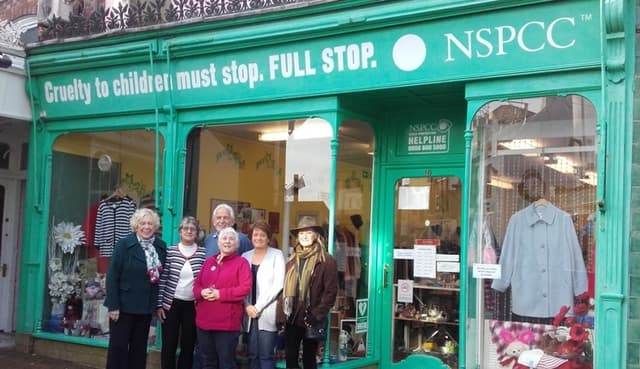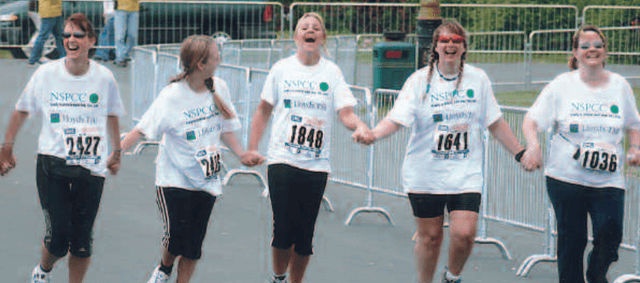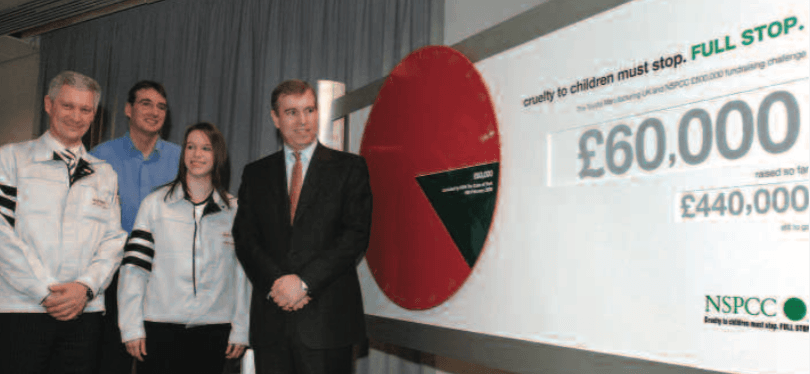NSPCC’s Full Stop campaign — a fundraising triumph. Part four: final challenges
Celebrating NSPCC Full Stop: how the biggest ever-public fundraising campaign from a British charity set out to transform child protection. In part four, we learn how the NSPCC capitalised on the amazing events described in part three to make the most of this unique campaign.
- Written by
- Giles Pegram CBE
- Added
- February 08, 2018
The half-way stage, and its challenge, and the final stages

Allowing volunteers to retire with honour
By 2002, the national appeal board had raised more than £125m and we were approaching the half-way point on the way to the appeal total. To ensure it remained on track, the board conducted a wide scale review of the Full Stop appeal.
Some of the volunteer leadership were tired, and had exhausted their prospects. For example, Sir Mark Weinberg and Dame Vivien Duffield had been instrumental in the success of the Centenary appeal in 1984 and again in Full Stop, and understandably wanted to retire. At the same time, the Duke of York was having to do increasingly more activities in his capacity as international ambassador for trade and industry. So he stepped down as chairman, and became patron of the campaign.
Despite the many demands on his time, His Royal Highness continued to offer great support, by hosting and attending events.
He held a dinner at Buckingham Palace for those members of the national appeal board who wanted to step down, acknowledging all that they had done, and asking that they still remain available for advice. They had contributed so much, and without them the Appeal would not have happened. They enjoyed themselves, having worked together so closely. They were able to stand down with honour. They felt valued, which was good stewardship.
Recruiting a new wave of volunteers
On the other hand, as the nature of philanthropy itself developed, a new breed of volunteer leaders was emerging. The early stage of the Full Stop appeal had brought on board a new generation of givers, “venture philanthropists”, who desired engagement with the activities of the charity at a much greater level, got involved with the appeal, and were truly committed to the aspiration of Full Stop.
One of these was the late Andrew Rosenfeld, then chairman of property investment company, Minerva plc. He agreed to take over as chair of the appeal. Andrew was not a high profile public figure but was committed, wealthy, gave very significantly, and got people to make significant gifts. He was a great, if unconventional, leader: young, and unused to failure. He was the living embodiment that you don’t need a high profile chair, one with ‘Sir’ or ‘Lord’ after their name.
The transfer of chairmanship, and key members, was seamless. As well as chairing meetings of the national appeal board, Andrew Rosenfeld’s company, Minerva plc, located, bought and re-furbished a site for the NSPCC Young People’s Centre in Tower Hamlets, a borough of London.
With a new chair, and new members of the national appeal board, the appeal got its second wind. Income started to grow, with new donors, new corporate partnerships and new events being organised. Andrew Rosenfeld maintained a thriving, successful appeal for the next stage, but it wasn’t easy.

The final stages
In 2005, the appeal was getting tired. Income was slowing and we were well short of £250m. The trustees of the NSPCC decided the appeal should end at the end of December 2006. The National Appeal Board didn’t dissent.
It looked as if we would fall short of our target. Then, the most extraordinary thing happened.
The members of the board had committed themselves to £250m. Each of them had roles in their day jobs that meant they were not used to failure. They didn’t intend to do so now, so there was a surge of energy and activity. We called it ‘finishing line fever’.
The board decided that everyone who had been involved in the appeal, including the grandees who had stepped down, and all the members of sub-committees and regional committees who had fulfilled their commitment, should be asked to do ‘one last thing’.
This surge of energy became real and was fascinating to watch. It manifested itself across all areas of fundraising. Nothing new, just renewed, infectious determination to do more of, and even better, the things I have written about.
I will give one, possibly the last, example.
During the summer of 2005, I met with Sir Mark Weinberg, my hero since his key role in the Centenary Appeal in 1984. He looked old and tired and didn’t really want to see me. But he agreed to do ‘one last thing’. He phoned a PR guru who was involved with the appeal. He, in turn, did ‘one last thing’. He phoned Rebekah Wade, editor of The Sun newspaper. She agreed to do her ‘one last thing’. In the week before Christmas 2006, she ran three front page spreads demanding that Gordon Brown, then prime minister, give £30m to the NSPCC to enable it to expand its helpline. On Christmas Day, he said ‘yes.’ (I’m not making this up). I phoned Sir Mark on Christmas Day (I was staff and staff didn’t do that). Of course he was thrilled.
On Christmas Day, 2006, we achieved £274,000,000. (I really am not making this up.)

'Whatever you can do or dream you can, begin it. Boldness has genius, power, and magic in it' (Goethe)
'Chance favours the prepared mind' (Pasteur)
Was this the end? Or merely the end of the beginning?
In the aftermath of the Full Stop appeal, it appeared that the NSPCC would fall short of its impressive £250 million target. But with one last push, they exceeded even their wildest dreams. And it doesn't end there! In our next instalment, Giles demonstrates how donor recognition played a key role in the aftermath of the appeal.


















